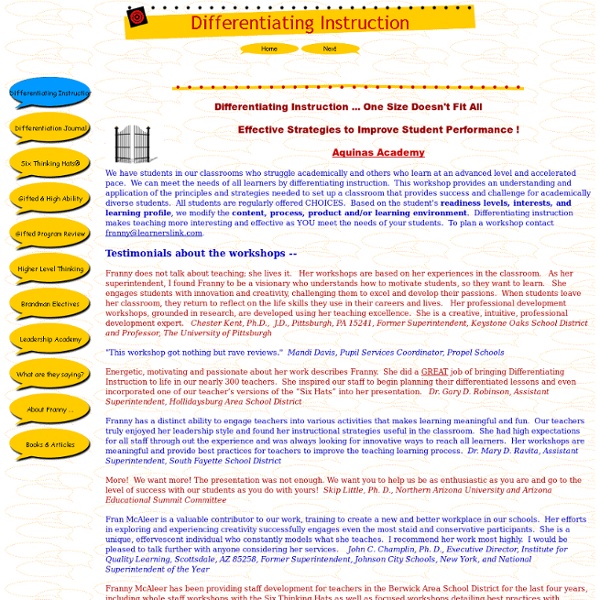resources
Resources Here are several books and articles pertaining to literacy and learning regarding boys and girls which should be of interest to all who want to inspire youths to enjoy the written or oral word. Booth, David. (2002). This book examines many issues that pertain to the “literacy lives” of boys. Blair, H. and Sanford, K (2004). This journal article explores what literacy means to adolescent boys. Millard, Elaine. (1997). This book focuses on researching the different experiences that boys and girls have with respect to the reading and writing curriculum. Ontario Ministry of Education. (2004). This ministry document is designed as part of an initiative to support student success in literacy. Peterson, Shelley. (2004) “Supporting Boys’ and Girls’ Literacy Learning.” This journal article makes an attempt to probe into some of the reasons as to why a gender gap exists in literacy scores between boys and girls in elementary school. This link is for information about book on ERIC
Differentiating the curriculum
The Policy and implementation strategies for the education of gifted and talented students: Support package: Curriculum differentiation (2004) (pdf 1345kb) provides an introduction to curriculum differentiation for gifted and talented students and is suitable for all stages of schooling. It needs to be read in conjunction with the Policy and implementation strategies for the education of gifted and talented students (revised 2004) and its companion document (2004) (pdf 270kb). The purpose of differentiating the curriculum is to provide appropriate learning opportunities for gifted and talented students. Three important characteristics of gifted students that underscore the rationale for curriculum differentiation (Van Tassel–Baska, 1988) are the capacity to: learn at faster rates find, solve and act on problems more readily manipulate abstract ideas and make connections. The creation of a differentiated curriculum requires some pre-planning. Definitions Article (pdf 25kb) Acceleration Web page
The Differentiator
Try Respondo! → ← Back to Byrdseed.com The Differentiator The Differentiator is based on Bloom's Taxonomy, Kaplan and Gould's Depth and Complexity, and David Chung's product menu. Try It In: French Dutch • Tweet It • Like Byrdseed • Pin It Students will judge the ethics of the [click to edit] using a textbook and create an essay in groups of three. Revised Bloom's Taxonomy adapted from "A Taxonomy for Learning,Teaching, and Assessing: A Revision of Bloom's Taxonomy of Educational Objectives" by Anderson and Krathwohl Depth and Complexity adapted from The Flip Book by Sandra N. Depth Big Idea Unanswered Questions Ethics Patterns Rules Language of the Discipline Essential Details Trends Complexity Multiple Points Of View Change Over Time Across the Disciplines Imperatives Origin Convergence Parallels Paradox Contribution Key Words Consequences Motivations Implications Significance Adapted from David Chung and The Flip Book, Too by Sandra N. Group Size One Two Three Four
Dare to Differentiate - 50 Terrific Teacher Tips!
Language Learning Strategies
What impact do learning styles and learning strategies have on second language learning? The strategies a student uses to learn a second language depend greatly on their individual learning style. Some students are outgoing and will experiment freely and frequently while learning a new language. Other students are more introverted, preferring a more individual, private approach to the way they learn and practice the language. What is the difference between learning styles and learning strategies? The phrase ‘learning style’ refers to a person’s general approach to learning and is dependent upon that person’s cognitive, affective and behavioral characteristics(Oxford, “The Role of Styles and Strategies in Second Language Learning”, 1989). back to top How can the SILL (Strategy Inventory for Language Learning) Survey be useful? Who is most likely to use learning strategies most often? What types of learning strategies do students use?
Tomlinson - Differentiation Central
Teacher Toolkits
The Planning for All Learners Toolkit Planning for All Learners (PAL) applies UDL to planning and developing curricula in ways that promote access, participation, and progress in the general education curriculum for all learners. The PAL Toolkit provides specific planning steps, guidance, mentoring, model lessons, tools, templates, resources, and links to other educators using the PAL Model. The PAL Toolkit can be used as part of a face-to-face training session, to provide ongoing follow-up support, or to train others. Internet Inquiry Toolkit The Internet Inquiry Toolkit is a resource for language arts, content area, and special education teachers (grades 5-10) who recognize that finding information on the Internet has become an essential literacy task for today's students. SEEC Toolkit
Using Bibliotherapy with Gifted Children - Unwrapping the Gifted
Hopefully we’ve all had that experience of reading a book that powerfully “spoke” to us, a book whose characters we could relate to, and whose struggles and triumphs we identified with. Taking this experience a step farther is the strategy of bibliotherapy, the process of helping the reader learn about and cope with any social or emotional struggles or developmental needs by identifying with a character in a book who shares a similar struggle or need. The reading is typically followed up by discussion with a trusted adult. Bibliotherapy of course can be done with all students, particularly students who might be experiencing a divorce in the family, a learning disability, adoption, etc. Today I want to talk a bit about using developmental bibliotherapy specifically with gifted students. The reality is that gifted kids don't always have everything going for them, despite what others may mis-perceive about them in that regard. * Who in the book do you identify with and why? Carry On, Mr.



